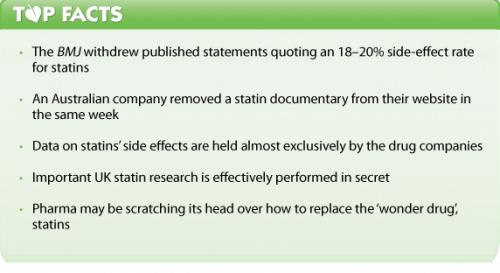Anyone with even half an eye on the news over the last week would have noted that Pharma’s statin fightback has commenced in earnest, with researchers and journalists critical of statins seeing their work altered and disowned. But is there more at work than meets the eye? Rather than fighting to maintain statins’ reputation, are drug companies puzzling over how to introduce the next generation of lipid-lowering agents?

No tolerance for statin dissent
Anyone, it appears, who challenges the mainstream narrative of statins as the side-effect free wonder drug par excellence can expect some serious blowback. Latest in the firing lane are Harvard MD John Abramson and UK cardiologist Aseem Malhotra, whose apparently cardinal sin was to quote a side-effect rate of 18–20% among statin-treated patients. That this figure was taken from an earlier paper made no difference: the BMJ bowed to pressure and withdrew the statements from both papers.
Meanwhile, on the other side of the world, Australian production company ABC also buckled under the strain and removed from its website a documentary entitled Catalyst: Heart Of The Matter. Fortunately for anyone interested in the truth about statins, it’s still available at certain blogs (click on 'Videos' in the box at the top of the screen to go directly to both episodes of the Catalyst documentary).
Professor Collins and the secretive CTT
The BMJ caved in under public pressure from epidemiologist Professor Rory Collins of Oxford University. Interestingly, however, while clearly preferring a high public profile for his pro-statin message, Prof Collins is far less keen on sharing the data upon which he bases his pronouncements. He is head of the Cholesterol Treatment Trialists’ (CTT) Collaboration, which appears perfectly happy to seal huge amounts of statin-related data from public view. As journalist Jerome Burne explains, “[The CTT] has an agreement [with the drug companies who own the data] to keep secret much of the information contained in its huge database which holds results from 27 trials of these drugs, nearly each of which was run by a drug company.”
Clearly not averse to some shameless fearmongering, Prof Collins apparently claimed to the Guardian newspaper that the alarm caused by Abramson and Malhotra’s papers was probably killing more people than were harmed as a result of the controversy surrounding Andrew Wakefield’s paper on the MMR vaccine. On 15th May, the Guardian quoted Prof Collins as saying, “I would think the papers on statins are far worse in terms of the harm they have done”.
Not so NICE
The UK’s National Institute for Health and Care Excellence (NICE) recently recommended offering high-intensity statin therapy to patients with a 10-year cardiovascular disease risk of 10% or more, down from 20% and largely reflecting the conclusions of a recent CTT meta-analysis. Oddly, however, the CTT doesn’t hold any statin side-effect data itself. Instead, it relies on trial reports published by...the statin manufacturers!
Waiting in the wings
It’s all about drug companies protecting their profits, you might say – and usually, you’d be right. Pfizer’s statin Lipitor (atorvastatin) was the world’s biggest-selling drug, causing a cliff-like drop in company profits when it went off patent. Pfizer’s proposed acquisition of Astra Zeneca and its “vaunted drug pipeline” may be a compensatory measure. Most statins have now joined atorvastatin off patent and earn very little for their manufacturers.
But never fear, pharma is here – with new and even more expensive statin replacements waiting in the wings. Pharma is effectively on the horns of a dilemma, itching to introduce its new lipid-lowering drugs but, as yet, unable to dispel the impression of statins as a side-effect free panacea.
Controlled statin demolition
Whatever the result of the ongoing spat at the BMJ, we can expect the myths around statins to begin crumbling very soon. Ironically, however, it probably won’t be because of widespread awakening to their risks, but because their manufacturers want them out of the way.
Call to action
- If your doctor prescribes statins, make sure your decision to accept the prescription is a fully informed one. Get educated on the cholesterol myth upon which statins are based, and consider other approaches, such as diet and lifestyle modification, to maintain a healthy heart
- To keep ahead of the debate, sign up to relevant blogs, such as those by Dr Malcolm Kendrick and Health Insight UK.








Comments
your voice counts
22 May 2014 at 11:37 am
I tried to view the Catalyst: Heart of the Matter on Youtube, but a message appeared saying it was private.
Is there any other way I can access it?
22 May 2014 at 12:17 pm
Hi Eoghan, we found a new link and have updated the story accordingly. The link is as follows: http://highsteaks.com/cholesterol/ - click on 'Videos' in the box at the top of the page.
22 May 2014 at 3:02 pm
I've been a natural healtcare practitioner for over 30 years. Since statins came out I have seen quite a number of older patients with unexplained muscle pain and fatigue. One that was particularly memorable was a lady with a very chronic and distressing bladder problem that had been invasively investigated many times (The bladder is a muscle of course). No physician ever indicated that the statins she was taking might be involved.
Testing using functional neurology we discovered that statins were a possible cause. Despite the idea being dismissed by her GP she elected to come off them herself. Her bladder problem practically ceased. We were then able to use natural methods to resolve the residue of the problem and she now is completely free of symptoms.
Admittedly, I only see people who are in trouble, but the odds indicate that there are a lot more people suffering out there without realising why. I find it very strange indeed that many health professionals are totally blinkered when it comes to statin side effects.
Your voice counts
We welcome your comments and are very interested in your point of view, but we ask that you keep them relevant to the article, that they be civil and without commercial links. All comments are moderated prior to being published. We reserve the right to edit or not publish comments that we consider abusive or offensive.
There is extra content here from a third party provider. You will be unable to see this content unless you agree to allow Content Cookies. Cookie Preferences